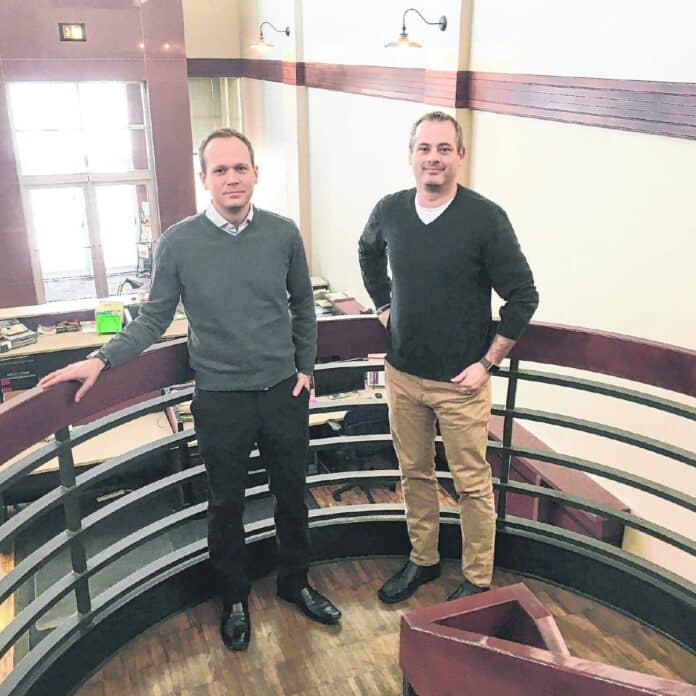
Jerald Cosey felt the weight of COVID-19 all around him. He was leading his team at a Greenwood senior care facility, caring for residents and for a season sleeping in a separate room at home.
Often during those days, he’d receive a text with a voice memo — someone offering a prayer for him.
After Cosey’s employer, American Senior Communities, hired Workforce Chaplains to offer spiritual support at its facilities, Cosey got to know Workforce Chaplains president Marcus Schrader.
“Marcus and I developed a relationship by me asking him to specifically pray for me as a leader,” Cosey said, adding those texts from Schrader reminded him he was not alone.
Workforce Chaplains, a 501(c)3 organization, began in 2018 with a few chaplains — among them several Hancock Countians — visiting businesses who’d invited them to make regular visits. Chaplains would engage with employees, offering a listening ear, a word or prayer, or even the possibility to meet offsite for a more extended — and confidential — conversation.
It began before the coronavirus closed some businesses’ doors for a season and drove many workers into home offices — some of whom have still not returned.
Though the workplace landscape around them changed, the chaplains found the demand for their services did not. In fact, in some sectors, the need for their support intensified.
“The added stressors that came into people’s lives … it just magnified,” Schrader said. “Companies started reaching out to us because it magnified the need even more.”
With a larger group of businesses to serve, Workforce Chaplains has a larger team today. The chaplain team includes men and women, people of various ethnicities, and a couple of chaplains who are bilingual in English and Spanish. This month it will have a training session for about 20 potential chaplains.
The organization’s chaplains visit its business clients, making the rounds to greet workers. Employees who are interested in the non-denominational spiritual support the chaplains offer can connect further; so can their immediate family members. Leaders of the group say their work fits in as a spiritual care piece of an employee assistance program and that a company is more likely to retain an employee who feels supported.
The team and its work have grown, thanks in part to added expertise in business development, as well as some help in analytics from a volunteer in New Palestine. Workforce Chaplains has also established an advisory council of other chaplains and ministry leaders to offer guidance and insight on best practices.
Now its list of clients includes American Senior Communities; a Chick-fil-A; an apartment complex; a home builder; and supporting staff at a school in Indianapolis. Some arrangements are funded by a company itself; some are initiated through grants and donations.
During 2020, offering spiritual care for companies’ employees included being available remotely, taking a rapid COVID-19 test before a visit, or — as Cosey notes — standing outside a senior care facility to offer encouragement to employees coming and going when chaplains couldn’t go inside.
“Being adaptable has made it work,” said Daron Day, an associate pastor at New Palestine Bible Church and Workforce Chaplains’ vice president of operations.
This year the support the chaplains offer might look like praying at the groundbreaking for a company’s headquarters, or planning a lunch-and-learn about racial tension, finance or another topic of interest in a workplace. Thanks to the analytics help they received, the chaplains can now present companies with data summarizing what types of general topics seem most pressing to their employees.
As chaplain Mauree Priest meets with workers, “The general theme is people need encouragement — even the strongest people,” she said.
“We’re an additional layer … in helping develop a positive work culture.”
These days, Cosey sees that positive culture impacting not only his staff but also residents. Now that chaplains can enter the building, they can engage with residents and even organize a religious service for them. He’s received text messages from colleagues expressing how much the chaplains’ presence means to them.
“Workforce Chaplains invests in the people who are caring for the people, and it’s an emotional investment,” he said. “I can’t imagine going through what we went through without my faith and without having people to lift me up in prayer. …
“They’ve just been phenomenal people to have in my life.”
[sc:pullout-title pullout-title=”Learn more” ][sc:pullout-text-begin]
Workforce Chaplains stress their offer of support to employees is optional, non-denominational and confidential.
Its chaplains have, in addition to their chaplain/ministerial training, done QPR training through Healthy 365 at Hancock Regional Hospital and mental health response training through Cumberland Police Department.
Find out more at www.workforcechaplains.com.
[sc:pullout-text-end]



